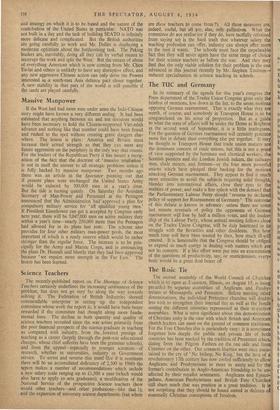The Basic Tie
The second assembly of the World Council of Ch LirJtcs which is to open at Evanston, Illinois, on August 15, is being preceded by separate assemblies of Anglicans and Presby- terians at Minneapolis and Princeton. Before meeting other denominations, the individual Protestant churches will doubt- b less wish to strengthen their internal ties as well as the bonds uniting the different countries represented at their respective assemblies. What is most significant about this demonstration of Christian unity is the case with which British and American church leaders can meet on the ground of common traditions. For the Free Churches this is particularly easy : it is sometimes forgotten how deeply the public and private life of both countries has been marked by the tradition of Protestant ethics, dating from the Pilgrim Fathers on the one side and front Cranmer on the other. Our common liberties were once main- tained to the cry of ' No bishop, No King,' but the lava of a revolutionary 17th century has now cooled sufficiently to allow Anglicans and Presbyterians to meet in amity and for the former's contribution to Anglo-American friendship to he affected by their royalist sentiments. Anglicans and Episco- palians, American Presbyterians and British Free Churches still share much that was positive in a great tradition. It is not surprising that they should be found united in defence of essentially Christian conceptions of freedom.


































 Previous page
Previous page